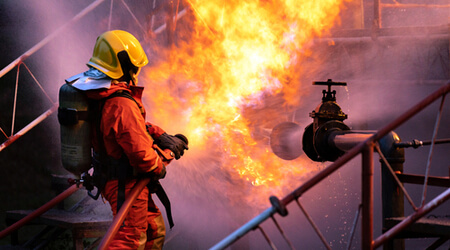
Data from the Occupational Health & Safety Administration (OSHA) indicate that there are on average 36 fire and explosion deaths per year in the construction industry. From underground gas lines to temporary heating devices to electrical systems, construction sites in South Carolina are full of hazards that can turn a day’s work from routine to explosive in an instant.
Injuries from fires and explosions are often severe, with ear, eye, brain, burn, and abdominal hemorrhage and perforation injuries common.
Workers injured in this way may be permanently disabled and disfigured, unable to return to their old jobs – or any job. Some lose their lives.
Joye Law Firm has represented injured construction workers for more than 40 years. If you need help putting together a workers’ compensation claim, fighting a denied claim or seeking additional compensation through a third-party lawsuit, call Joye Law Firm now or send us a message to schedule a free case review.
Construction Site Fire and Explosion Hazards
A single spark – or mere dust, in the case of an arc flash – can set off a construction site fire or explosion that injures numerous workers. Some of the leading causes of these incidents include:
- Compressed gas cylinders
- Flammable and combustible liquids
- Chemical tanks or drums
- Temporary heating devices
- Explosives and blasting agents
- Liquefied petroleum gas
- Vehicles and heavy equipment
- Electrical malfunctions and shorts
Fires and explosions kill 200 and injure more than 5,000 workers across all industries each year, according to OSHA. Over an 11-year period, OSHA recorded 361 fire or explosion deaths in the construction industry. Nearly a quarter of these fatalities occurred in multiple-death incidents.
The incidents responsible for the most deaths were:
- Chemical explosions
- Fires
- Pressurized container explosions
- Arc flashes and blasts
OSHA and Fire Protection
OSHA requires employers to implement workplace fire protection and prevention programs. The regulations include:
- Fire protection (standard number 1926.150): “The employer shall be responsible for the development of a fire protection program to be followed throughout all phases of the construction and demolition work.”
- Flammable liquids (1926.152): “Only approved containers and portable tanks shall be used for storage and handling of flammable liquids.”
- Temporary heating devices (1926.154): “Heaters used in the vicinity of combustible tarpaulins, canvas, or similar coverings shall be located at least 10 feet from the coverings.”
- Blasting and the use of explosives (1926.900): “The employer shall permit only authorized and qualified persons to handle and use explosives.”
Compensation for Fire and Explosion Accidents
Most construction workers understand that they are entitled to workers’ compensation through their employer for virtually all on-the-job injuries, regardless of how it occurred or who was at fault. What they may not know is that workers’ comp is not always the exclusive remedy for job site injuries.
Although you can’t sue your employer, you may be able to sue a negligent, non-employer third party. This could be a property owner, a general contractor, a subcontractor or others. Whoever it is, you must show that they were somehow negligent, and that their negligence caused your injury.
Violation of an OSHA regulation, such as those described above, may be evidence of negligence. Other forms of evidence are also admissible in these third-party lawsuits. Any money that you recover through a third-party lawsuit should not affect your ability to collect workers’ compensation benefits.
Contact a South Carolina Lawyer About Your Injury in a Workplace Fire or Explosion
If a fire or explosion at your place of work has left you seriously injured and disabled – or claimed the life of a loved one – you need a full investigation and assessment of the accident. You may be eligible for compensation that will aid your recovery far beyond what workers’ compensation benefits provide.
Don’t delay and let evidence about responsibility for your fire or explosion accident get lost. Call Joye Law Firm now or complete our online form to set up a free initial consultation.
Sources:
- Occupational Safety & Health Administration:
- The Center to Protect Workers’ Rights: Fire and Explosion Deaths in Construction
- Centers for Disease Control and Prevention: Explosions and Blast Injuries
































